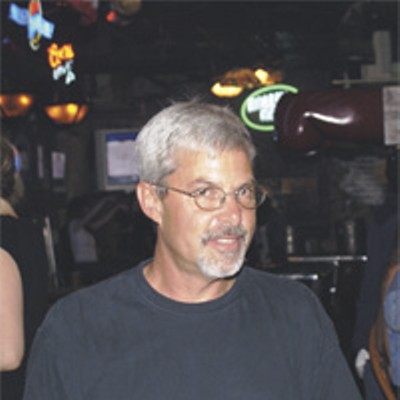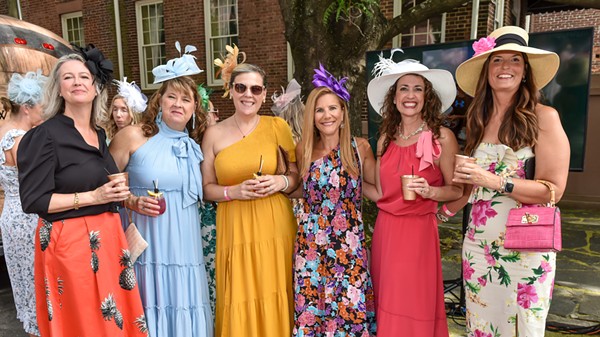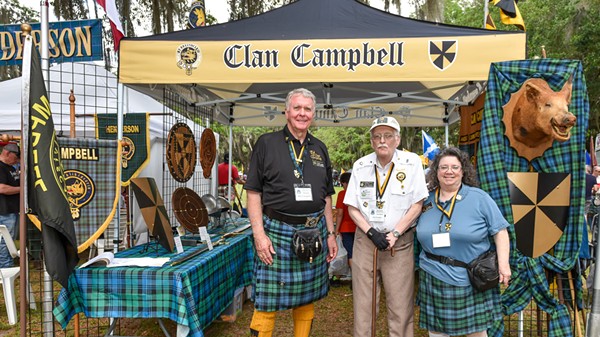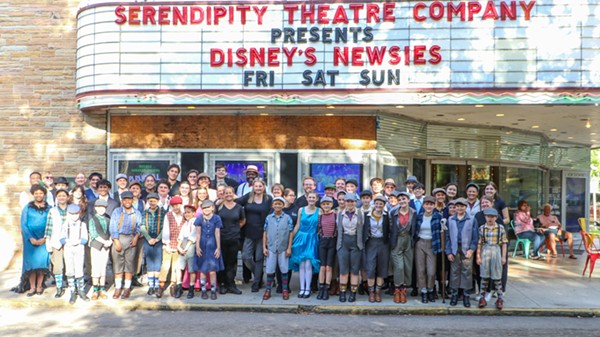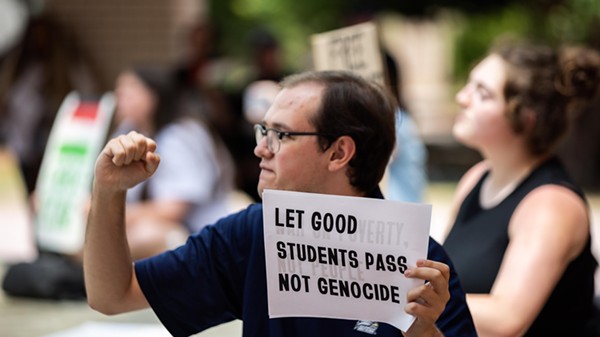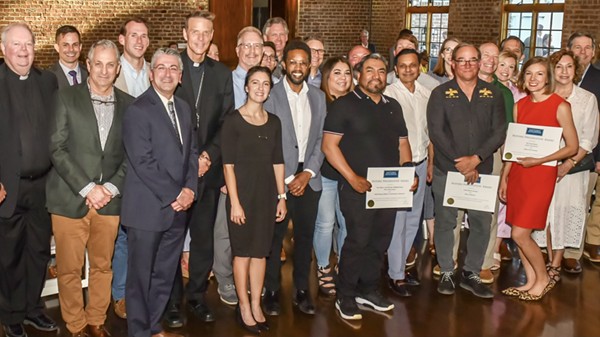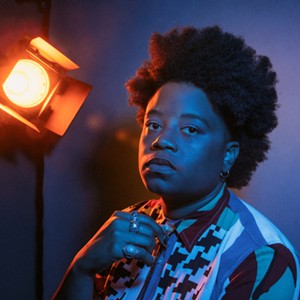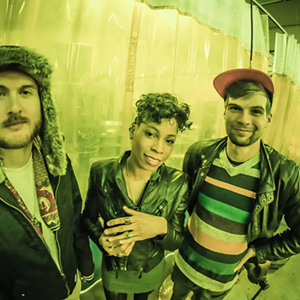ANYONE WHO KNOWS ME KNOWS that I’m very bad with dates.
So you’ll forgive me if I can’t pinpoint exactly when I first got the call that Steve Andrews had been diagnosed with what was characterized as a terminal case of cancer.
A year and a half ago? Maybe two? Surely not three. I’m just not sure.
The chronology is a haze.
I can remember the phone call itself, though — clear as day. It came out of the blue, like most things of that sort do. You know the drill: someone who’s led a visible, perhaps outsized life within a certain community (in this case, the local music scene) receives word that they supposedly only have a short time to live and that their chances of a full or lasting recovery are slim to none.
Before long, the proverbial telephone game has begun.
In fairly rapid succession, word leaks out, and before you know it, dozens of calls are placed — from peer to peer and friend to friend. In the space of a day or two, it seems that most people in a decent-sized circle are apprised of the situation second and third-hand.
They —in varying degrees— spend the next few days mulling it around in their heads; reflecting not only on their own personal relationship with the stricken but on the announcement’s possible relevance to their own lives, their own mortality.
The conversation that day was long and involved. I listened patiently for what seemed like 15 or 20 minutes while the person on the other end of the line ran down every detail they could remember about what the doctor had told Steve about his condition and his odds of remission and Steve’s supposed response.
I listened while the bearer of the dispiriting news told me he was absolutely certain that Steve was not going to take this news lying down; that he had pledged to fight the disease as best he could and to the bitter end.
I know scores of other folks who had similar, lengthy, rather lopsided conversations on that same day. Like me, they had all been called by Steve himself.
In a way, it was totally in line with Steve’s personality. It’s hard for me to recall a conversation of any length or import with the man that wasn’t laced with a bit of hucksterism and melodrama.
It was just his way.
My sometimes stormy relationship with Steve began back in the mid-to-late ‘80s. He, along with former truck driving brothers Quincy and Russell (later Ross) Jones (my friends and I often good-naturedly referred to this rather motley crew as The Trinity) partnered up to open Congress St. Station, a showcase-style live music venue in a slickly appointed location one door East of what is now called the Mercury Lounge.
Between 1988 and 1993, Congress St. Station would essentially serve as base of operations for the local, original art-pop quintet City of Lindas, of which I was a founding member.
When myself and the rest of the group weren't rehearsing onstage before business hours, trying out new material as a weekend night headliner (or opener) in front of our hometown fans or simply catching whoever else was playing there, we could often be found helping out around the place, either as salaried staff, part-time employees or eager volunteers who were happy to swap their free time and manual labor for what amounted to a semi-permanent, all-access backstage pass.
For ambitious (or at the very least, curious) college-aged rock band types, it was an enviable situation, to be sure.
The Trinity's place was perhaps the first local multi-level bar and entertainment complex that attempted to offer a little something for everyone: standout local bands and well-known regional and national acts on the ground level; pool and other games in the basement; and live DJs spinning a variety of dance and industrial music on the upper levels. Of course, each floor had its own full bar.
Steve had already dabbled a bit in this sort of thing, but never on such a scale, and I’m not sure that his partners had ever done much in a club before other than enjoy themselves to the fullest extent of their abilities. However, over the next several years, Congress St. Station became arguably the most successful live music room this town has ever seen — surpassing even the fabled Night Flight Café (which had previously outfitted and occupied the ground level of this impressive space).
This was due in large part to Steve’s willingness to present relatively low-brow, flavor-of-the-month acts as well as high-dollar, critically-acclaimed artists.
You see, whereas the folks behind the Night Flight (which had upgraded to these stylish and high-tech Congress St. digs for a short while after vacating their snug, original location on the far West end of River St.) were dyed-in-the-wool music lovers with fairly unimpeachable taste and a knack for knowing shit from shinola when it came to unknown talent — Steve enjoyed music as many do, but at that time never seemed particularly knowledgeable of —or inquisitive about— that world.
I would soon come to learn that this sort of sideways entry into the world of concert promotion and nightclubbery wasn’t at all uncommon. However, to a young man who’d been raised to view live musicians with a certain amount of reverence and fascination, it struck me as bizarre.
How, I thought time and again, could a guy who doesn’t even obsessively read a relatively milquetoast, mainstream monthly like Rolling Stone —let alone the more in-depth, genre-specific rags— with any degree of regularity be the talent buyer of a full-time live music venue?
How too, I thought, could someone who exhibited so little passion for the music itself be so passionate about presenting it to the public?
There were times it seemed that Steve was much more in love with the idea of promoting concerts than the concerts he was actually promoting (although he clearly loved what he did).
Yet an argument could be made that the Night Flight eventually failed —at least in part— because the owners couldn’t bring themselves to not book a steady stream of amazing artists they felt deserved to be seen — simply by virtue of the caliber of their artistry or reputation.
For years, their place was an oasis of hipness in a town often devoid of such things; a nirvana for informed record collectors and music enthusiasts.
Alas, a market such as ours can be easily overestimated, especially when one’s own passion for art and beauty is a key element in the decision-making process, and many of the best artists charge the most money to show up and do their thing.
As the partner primarily in charge of choosing which acts to book at Congress St. Station, Steve didn’t suffer from the same fanboy obsession that allowed the Night Flight to burn out in an embarrassment of musical riches.
He’d take chances on unknown acts that other club owners wouldn’t touch with a ten-foot pole. This was both a positive and a negative attribute for all concerned — as one might imagine.
Time and again, he risked large amounts of money on paying high guarantees for artists with no track record, no momentum and no radio or tour support — simply because a pushy booking agent (you know, the folks whose job it is to find gigs for artists, regardless of their worth) had sold him on their client.
He’d just as quickly book some flash-in-the-pan hair metal band from the Midwest that anyone who followed trends (or simply actively listened to popular music) could tell was clearly going nowhere, as he would a legitimately famous and respected singer-songwriter with a mile-long back catalog and the rapturous approval of the rock intelligentsia.
By that same token, however, Steve’s willingness to take a chance on presenting an act based on the recommendations of those of us in the extended Congress St. family (bartenders, sound and light people, stage managers, etc...) meant that on several occasions Savannah was treated to appearances by highly influential or cutting-edge musical artists that would likely never have performed here otherwise — on account of their low profiles or lack of commercial radio airplay.
Truthfully, the strangest aspect of Steve’s approach to choosing who to book (and how to pair up headliners and opening acts) was how much of it was left entirely to chance.
And so, partially as a result of that sometimes completely unpredictable roster of live acts, for a surprisingly wide swath of the local populace (which included locals, SCAD kids and faculty, Rangers, Armstrong students, older Night Flight devotees and a healthy number of tourists), his club was THE place to be for quite some time.
Congress St. Station ultimately closed in the early ‘90s with little warning. It was a depressing, shady end that left a bad taste in the mouths of all connected with the place. But despite that sad scene, Steve never strayed too far from the business of presenting live music.
He also never stopped dreaming of recapturing the success and notoriety that he enjoyed as Congress St.'s most visible proprietor.
In later years, he’d try once again to replicate those glory days through a fairly disastrous attempt at opening a combination live entertainment venue and restaurant (The Music Grill) in a Southside location few save him thought viable for such an endeavor. (It’s worth noting that in a rare public display of the rancor he sometimes showed to friends and associates, Steve defiantly left a large sign on the shuttered club’s marquee lambasting the entire community for not being as supportive of the venue as he'd expected.)
He also played a key role in many of River Street's larger-scale St. Patrick's Day Festival concerts, and was the public face of Live Oak Productions: the first (and, it should be said, pretty much the last) indie promotion outfit to make regular use of downtown’s Historic Roundhouse grounds for ticketed, public pop and rock shows.
More often he could be found working for (at different times) both Portman’s and Rody’s Music, handling logistics for their PA rental divisions, and on his own, helping to organize and manage area concerts, charity benefits and music festivals of all sizes and shapes.
It was not uncommon to run into Steve anywhere in the greater Savannah area where folks were gathered to hear some live music or watch an outdoor film. Usually he’d be there acting in some sort of official capacity: either as a stage manager, production coordinator or merely keeping an eye on the rented sound, lighting or staging equipment.
Sometimes, though, he’d just be there as a guest: an audience member like the rest of us — albeit one with instant name and face recognition among the crew members, which often allowed him to get closer to the action than most.
For many years now, my dual roles as both a professional musician and an entertainment journalist have —to a somewhat lesser extent— afforded me that same sort of recognition. And so, it became something of a ritual that Steve and I would play catch-up and reminisce a bit with each other on such occasions.
Every once in a blue moon, things could feel tense between us, because Steve and I had in some ways come of age in the live music game together, and he was never shy about holding a grudge for a good long while if he felt he’d been impugned or underestimated.
I recall a time when I selected a double-bill at The Music Grill as one of this paper’s Recommended Concerts of The Week, and gave it a glowing advance write-up. Unfortunately, I also mentioned that the opening band really had nothing in common stylistically with the headliners, and, as a service to our readers, suggested that unless one’s tastes were exceedingly open, they be prepared to likely appreciate either of the acts as opposed to both.
The moment that issue hit the streets, Steve phoned me and unleashed one of the most vicious, belabored tirades I’ve ever endured.
Screaming at the top of his lungs, cursing a blue streak and seemingly nearing apoplexy, he demanded to know just who the hell I thought I was. How dare I, he bellowed, show such a lack of respect for “my elders” (even though he only had about ten years on me).
Nevermind the fact that I had steered people to the show, affording his floundering business no small amount of free publicity. According to Steve, I simply didn’t understand his “booking genius.”
I later heard from a friend that they had dropped by The Music Grill a little later that afternoon for a beer — just in time to see Steve throw open the front door and hurl the metal Connect Savannah rack (filled with a tall stack of that week’s issue) with all his might into the club’s parking lot, where it remained for at least a week.
Things were chilly for a while after that, but several months later, he called to apologize, and I allowed that perhaps I could have shown more optimism in my preview.
No sooner were those simple statements made, than we were back on good terms. It was just his way.
I last saw Steve a couple of months back at the Savannah Jazz Fest in Forsyth Park where he had been hired to plan and supervise production of the entire event. He was running around frantically as usual, overseeing minute details and attending to the onstage talent. He looked surprisingly energetic and at times somewhat radiant in his element. He’d survived so long past his original life expectancy it was easy to forget that he was so very ill.
He passed away on Dec. 30 after what’s been described as a sudden downturn.
As I could not attend the funeral ceremony, I made a point to stop by and pay my respects at the visitation the night before. Signing the guest register, I could not help but notice the smattering of names already inscribed. They read like a who’s who of local musicians, music store employees, stagehands, radio personalities and service industry types old enough to have been regulars at Congress St. Station in its heyday, or to have worked alongside Steve in the years since.
I saw many folks I have not seen in years. Some I have not seen in a decade-and-a-half. All I spoke with bemoaned this loss and praised Steve for being a unique figure in a town known for them, and each seemed in possession of at least a few humorous, ribald or endearing personal anecdotes about the man.
As his brother Frank —a wonderful musician and music biz veteran in his own right— busied himself introducing the gathering strangers to one another —making sure to note how many of those present were players themselves (regardless of public acclaim)— my mind could not help but wander to the long, long list of live music events which Steve had been involved with over the years.
There were too many to count, and plenty that I’m sure I never knew about.
It’s important to note and remember that in a town such as ours, which is constantly (and unjustly) belittled as “never getting any good concerts,” that some folks over the years have devoted themselves —for whatever motives— to putting in long hours of hard, often thankless work, not to mention opening themselves up to great financial risk, just so people in this area could let their hair down and have a good time while enjoying live music.
For the record, hard as it may be to believe, the following are only some of the artists Steve Andrews had a direct hand in presenting to Savannah crowds over the past two decades:
24-7 Spyz, Aleka’s Attic (featuring River Phoenix), Allgood Music Co., And Sometimes Why?, Argyle, Murray Attaway of Guadalcanal Diary, The Black Crowes, Blessid Union of Souls, Bonepony, Jason Bonham, The Call, Captured! By Robots, Cheap Trick, The Chickasaw Mudpuppies, Alex Chilton, City of Lindas, The Connells, Creed, Taylor Dayne, The Dead Milkmen, Derek St. Holmes, Dillon Fence, Doc Holliday, Dreams So Real, Drivin-N-Cryin, Dumptruck, The Ellen James Society, The EROK Trio, The Feelies, Melissa Ferrick, Fetchin’ Bones, Firehose, Firehouse, Follow For Now, The Four Horsemen, GAM, The Georgia Satellites, The Gin Blossoms, Glass Eye, The Goo Goo Dolls, The Grapes, Patty Griffin, Hall & Oates, Hawkwind’s Nik Turner with Helios Creed, Hootie & The Blowfish, Identity, Insane Jane, Jackal, Jerry's First Coma, Joan Jett & The Blackhearts, The Jody Grind, Johnny Quest, Eric Johnson, Jupiter Coyote, King’s X, Kodac Harrison, Little Caesar, Living Colour, Love Tractor, Magnapop, Michelle Malone & Drag The River, Manitoba’s Wild Kingdom, The Marshall Tucker Band’s Toy Caldwell, Edwin McCain, Me ‘an Mills, Mojo Nixon, Molly Hatchet, Steve Morse, Mother’s Finest, Mr. Big, Nitro, The Otis Brothers, The Glenn Phillips Band, Pretty Boy Floyd, Project/Object with Ike Willis and Don Preston of Frank Zappa's Band, Pylon, Rare Earth, School of Fish, Seven Simons, Something, The Nightporters, The Rembrandts, The Replacements, The Rev. Horton Heat, Jonathan Richman, The Smithereens, Stuck Mojo, The Supreme Court, The Swimming Pool Q’s, Trixter, Robin Trower, Ugly Kid Joe, Uncle Green, The Veraflames, Warrant, The Washington Squares, White Buffalo, White Trash, Widespread Panic, Webb Wilder & The Beatnecks, Lucinda Williams, XYZ and Warren Zevon.Ruminate on that for a while.
He was also instrumental in convincing our City Council of the time to craft an ordinance (sadly revoked just a couple of years back) which allowed people under the legal drinking age of 21 to enter nightclubs which featured bona fide live entertainment — such as concerts or standup comedy.That ordinance had a TREMENDOUSLY positive impact on both Savannah's cultural diversity and its viability (at that time) as a destination for major touring acts.
His brother Frank told me with a smile at the visitation that he felt Steve had “done more for the local music scene than any other one person — both intentionally and unintentionally.”
That’s funny, but it’s true. And he will be missed.

